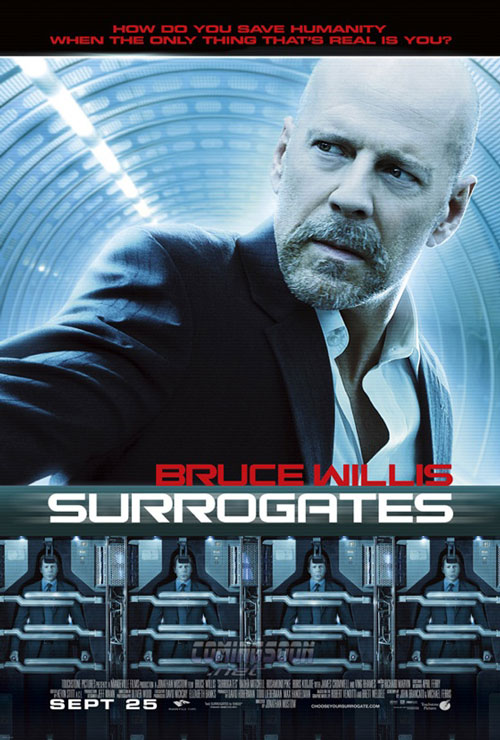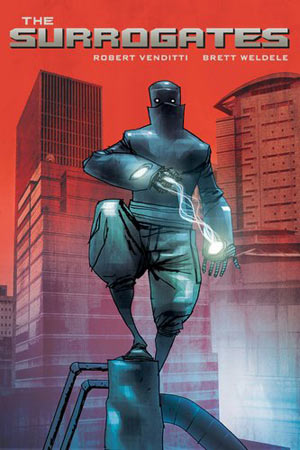Good Comic, Bad Movie: Surrogates Early DVD Review
/
Films about robots usually fall into two categories. The first is a thoughtful exploration of artificial intelligence and what it means to be human, with a healthy dose of technology run amok (Blade Runner, A.I.: Artificial Intelligence). The second offers yet another excuse for Hollywood to blow stuff up real good, with plenty of opportunities for robotically-assisted, consequence-free violence (Alex Proyas’ I, Robot, Transformers). Occasionally, as with the better Terminator films and the first RoboCop, both categories can be covered at the same time, but this is rare. The 2009 Bruce Willis vehicle Surrogates has a premise that could have easily lent itself to an interesting exploration of some of these ideas (as did the 2005 Top Shelf miniseries that inspired it), but is far more concerned with guns, chases, and property damage.

The Surrogates comic series, by Robert Venditti and Brett Weldele, told of a future where nearly all humans live their lives through robot duplicates that they control from their homes. These surrogates, or “surries”, represent their idealized body image, and have revolutionized everything from police work to the dating scene. However, a mysterious assailant has begun destroying people’s surrogates with a strange electrical weapon, forcing their operators to live life through their actual bodies again. A detective named Harvey Greer, himself living through a surrogate body, is assigned to the case; Greer seeks to uncover a connection between the assailant and a rabid anti-surrogate cult known as the Dreads, but he soon learns that they might all be pawns in a larger conspiracy. Well-paced, thoughtful, and resolutely downbeat, The Surrogates is closer in tone to Se7en or the aforementioned Blade Runner.
Surrogates, the film (which drops the The for some reason) adds a lethal twist to the comic’s scenario; the disabling of the surrogates through the use of the assailant’s energy weapon destroys the user as well. Bruce Willis plays Greer, whose first name is now Tom and who is also now an FBI agent. Assisted by his partner Peters (Radha Mitchell), Greer seeks the killer while investigating how the original inventor of surrogate technology (James Cromwell) might be involved. Willis’ Pulp Fiction co-star Ving Rhames appears as the leader of the Dreads, and there’s a subplot involving Greer’s strained marriage (Rosamund Pike plays his wife, who can’t stand the thought of living in her flesh-and-blood body for even a second). There are also hints of military-industrial intrigue, but that subplot fizzles out pretty quickly.
Surrogates is directed by Jonathan Mostow (Terminator 3: Rise of the Machines, U-571), no stranger to slick, generic thrills, and the script was written by his T3 collaborators John D. Brancato and Michael Ferris. The film sidesteps any potentially interesting philosophical questions about identity and self-image, as well as other possibilities like a half-developed idea about intrusion of privacy in the name of law enforcement, and is instead concerned with action and explosions. This might be acceptable if any of those actions or explosions were particularly cool or exciting, but everyone involved in Surrogates seems to be operating on autopilot. At 89 minutes, it somehow feels much longer. The history of the surrogate technology is told in an opening credits sequence that is punctuated with title cards reading “7 years ago” and “5 years ago”, culminating in a title card that reads “Present Day”. Huh? What year is it again? This movie takes place right now? Shouldn’t those cards read “7 years from now”, etc.? Anyway, there are a few striking images in Surrogates that stay with you past its running time—the streets filled with perfect supermodel pseudo-people who drop like puppets with their strings cut when they are disabled en masse, Greer’s mangled surrogate body displayed on a crucifix by the Dreads, Greer literally punching the face off of a laughing surrogate party-boy—but not much else makes an impact. CGI is utilized to give the surrogates a waxy, artificial look, but this instantly negates any suspense about who may or may not be in a real body. Surrogates’ best scene happens during a car chase, where Greer, driving up onto a sidewalk, begins piling hapless surrogate bodies onto the hood of his speeding automobile. It’s a funny scene in an otherwise humourless movie. For the most part, though, Surrogates might as well have been written and directed by robots.




